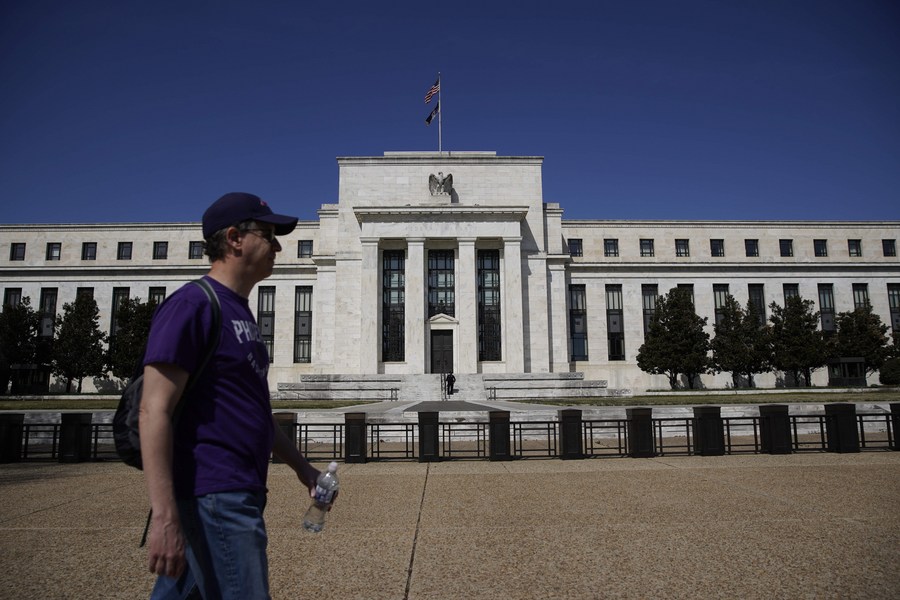US Fed rate hike unlikely to derail China's growth

A man walks past the US Federal Reserve in Washington, DC, on March 16, 2022. [Photo/Xinhua]
The United States Federal Reserve's fresh tightening cycle is unlikely to derail China from launching more robust monetary measures to support the economy, which could provide upside potentials in Chinese financial assets, experts said on Thursday.
Their remarks were in response to the Fed's decision on Wednesday to raise key interest rates by a quarter of a percentage point to the range of 0.25-0.5 percent, embarking on a tightening cycle to tame inflation that could bring interest rates to about 1.9 percent by the end of the year.
Experts said the tightening could push yields of dollar-denominated assets higher and put capital outflow pressure on many emerging markets, keeping them from monetary easing, which could intensify the outflow pressure.
However, China could be an exception, they said, as a stable Chinese yuan and mild consumer inflation may still enable the People's Bank of China, the country's central bank, to launch more accommodative measures.
Zhu Haibin, JP Morgan's chief China economist, said he expects the yuan to stay fairly stable and withstand the outflow pressure caused by a growing monetary policy divergence between China and the US. This is because of the robustness of the Chinese economy relative to many other markets and the country's policy tools to buffer outflow pressures.
The central parity of the onshore yuan against the US dollar strengthened on Thursday, up 394 basis points to 6.3406, sending the year-to-date rise of the yuan against the dollar to 351 basis points, despite recent fluctuations.
"The Fed's rate hikes remain a secondary or indirect factor in China's monetary policy setting, which is actually more oriented to domestic situations and the goal of steady growth and stable inflation," Zhu said.
The PBOC, therefore, has the room to cut policy interest rates by 10 basis points and the reserve requirement ratio by 50 basis points in the coming months, he said.
Also providing room for easing is price levels, he added. Even after factoring in rising commodity prices amid geopolitical tensions, China's annual growth in the consumer price index, a main gauge of inflation, may remain below the government's target of 3 percent at roughly 1.7 percent.
Government data showed that China's CPI grew by 0.9 percent year-on-year in February, the same as in January.
A key meeting chaired by Vice-Premier Liu He on Wednesday urged proactive steps by monetary authorities to keep proper growth in new loans, as part of a host of measures to boost the economy and stabilize the capital market.
David Chao, global market strategist for the Asia-Pacific region (excluding Japan) at Invesco, a global investment management company, said the meeting reassured international investors that policymakers are willing to "take a more forceful approach" in ensuring that economic headwinds are mitigated.
Chao said he foresees the monetary policy divergence between China and the US expanding over the next couple of quarters with more robust easing in China, which could boost earnings and valuations of Chinese A shares.
China's A-share market rallied for the second session in a row on Thursday, as the Shanghai Composite Index rose 1.4 percent to close at 3,215.04 points.
Photos
Related Stories
Copyright © 2022 People's Daily Online. All Rights Reserved.










